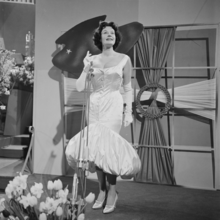Margot Hielscher
show This article may be expanded with text translated from the corresponding article in German. (August 2010) Click [show] for important translation instructions. |
Margot Hielscher | |
|---|---|
 Margot Hielscher at the Eurovision Song Contest 1958 | |
| Background information | |
| Born | 29 September 1919 Berlin, Germany |
| Died | 20 August 2017 (aged 97) Munich, Germany |
| Occupation(s) | singer |
Margot Hielscher (29 September 1919 – 20 August 2017)[1] was a German singer and film actress. She appeared in over fifty films between and 1939 and 1994.
Hielscher was born in Berlin. In 1957, she was chosen to represent Germany at the Eurovision Song Contest 1957 with the song "Telefon, Telefon" (Telephone, Telephone). The song finished fourth out of ten, with eight points.
Hielscher was chosen again to represent Germany at the Eurovision Song Contest 1958 with the song "Für Zwei Groschen Musik" (Music For Two Pennies). The song finished seventh out of ten, with 5 points.
In 1989, she starred in the TV series Rivalen der Rennbahn. She died in Munich, aged 97.
Awards[]
In 1978, she was awarded the "Bundesverdienstkreuz" and in 1985 the "Filmband in Gold" for her contributions to German cinema.
Selected filmography[]
- The Heart of the Queen (1940)
- Goodbye, Franziska (1941)
- Love Premiere (1943)
- Women Are No Angels (1943)
- Ghost in the Castle (1947)
- Hallo, Fräulein! (1949)
- The Blue Straw Hat (1949)
- Love on Ice (1950)
- Nights on the Road (1952)
- The Devil Makes Three (1952)
- Homesick for You (1952)
- Hit Parade (1953)
- Jonny Saves Nebrador (1953)
- Salto Mortale (1953)
- It Was Always So Nice With You (1954)
- The Mosquito (1954)
- Murder Party (1961)
- The Blood of the Walsungs (1965)
- Salto Mortale (1969, TV series)
- (1977, TV film)
- The Magic Mountain (1982)
See also[]
References[]
- ^ SPIEGEL, DER. "Leinwand-Legende Margot Hielscher gestorben - DER SPIEGEL - Kultur". www.spiegel.de.
External links[]
![]() Media related to Margot Hielscher at Wikimedia Commons
Media related to Margot Hielscher at Wikimedia Commons
- 1919 births
- 2017 deaths
- Eurovision Song Contest entrants for Germany
- Eurovision Song Contest entrants of 1957
- Eurovision Song Contest entrants of 1958
- Musicians from Berlin
- Actresses from Berlin
- Officers Crosses of the Order of Merit of the Federal Republic of Germany
- Eurovision Song Contest stubs
- German singer stubs